The Life of an ARTrepreneur
Some people know Felicia Perry from her time as a dancer with Ananya Dance Theatre. Others know her as an economic activist who served on the inaugural executive committee and board of the Association for Black Economic Power. Many know her for her fashion designs at Feeperella, or as the radio show host of DesignHER Life on KRSM, or as a community and business development organizer with the West Broadway Business and Area Coalition. But chances are, if you know her for just one or even two of these things, the rest will still come as a surprise.
“It doesn’t always make sense to people,” she laughs. She recalls being in India on tour with Ananya Dance Theatre when her photo appeared in Forbes online for her work around Black economic liberation. “People were saying, ‘Wait, I thought you were a dancer?’ because that’s how they know me.”
Such is the life of the “ARTrepreneur,” as she describes herself—an artist AND entrepreneur, because to be an artist making a sustainable living, once must also be an entrepreneur, and a savvy one at that. And savviness as an ARTrepreneur means taking advantage of every single opportunity available to you, developing skillsets in multiple different areas, making and nurturing connections with others in shared spaces, and using all of the knowledge you’ve gained and skills you’ve developed to further evolve into other pursuits. And, eventually, all of these various pursuits will connect, each one informing the next, until it all seems quite natural.
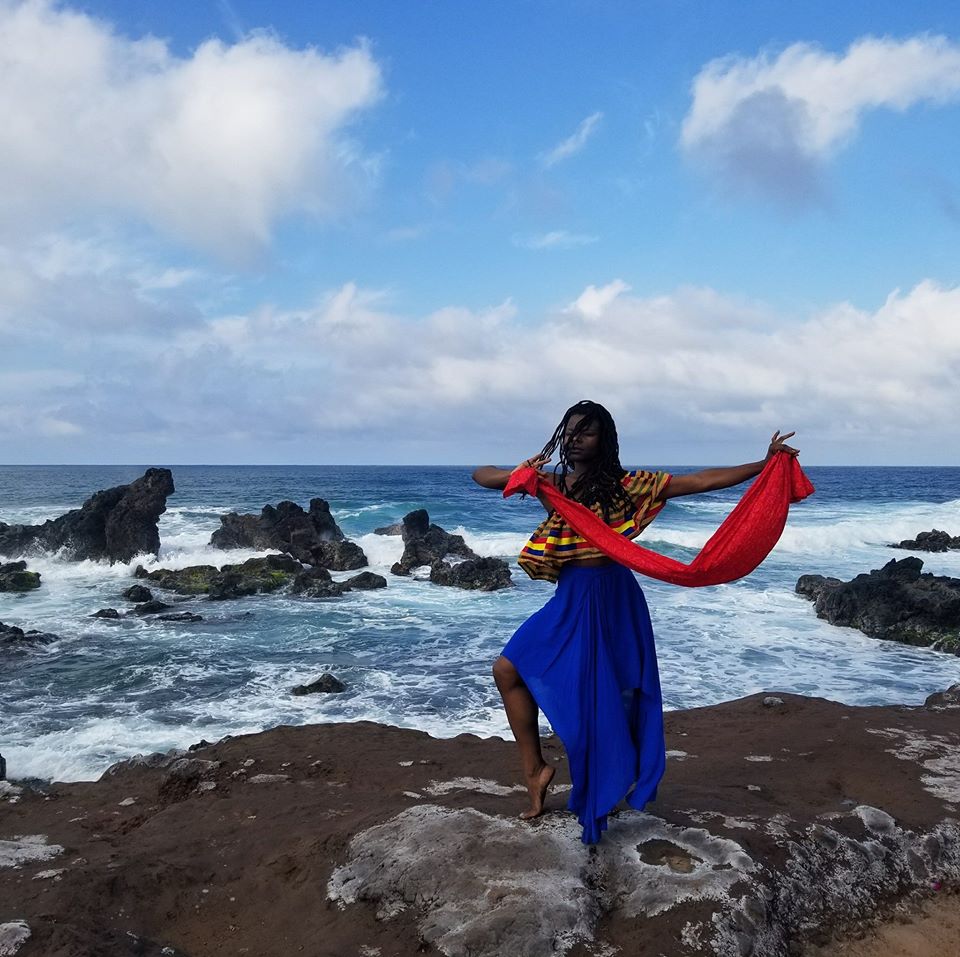
“I’m not one- or two- or even three-dimensional, and that’s what a lot of my work is about,” she says. “I’m really trying to have space as a creative person to be all of those things, because, as a working artist, one of the things that bogs us down is feeling like we’re in a box. But we do it to each other in how we force people to show up. I struggled with that as a dancer because I wasn’t trained professionally at a young age; I didn’t start dancing professionally until I was 37.”
Perry actually didn’t call herself an “artist” for most of her life, even though she was always creating something from a very young age—drawing, creating patterns with braids and styles with hair, making clothes. “All of that was cultivated through curiosity,” she says.
One of her first jobs, while she was in junior high, was as an assistant artist for the Department of Arts & Design at Bethel University. Her job was “basically painting all day,” helping to put together an art show that they were producing for their centennial.
“It was my earliest experience as a professional artist and getting paid to do something,” she says. She would then do things like draw portraits in charcoal for some extra cash, but ended up in the corporate world working in finance for over a decade. She ultimately exited that world to explore her creative side as well as for the sake of her own health and well-being. She started a craft business making items like scarves and yoga pants while also working in education, and turned those self-taught creative pursuits into full-time fashion design with her couture brand Feeprella.
At that same time she started exploring performance art. She had done some theatre in high school, but it wasn’t something she pursed professionally or even thought was a potential career. “But once I left corporate America, I needed to make money,” she explains, and she pursued every available opportunity to do so creatively.
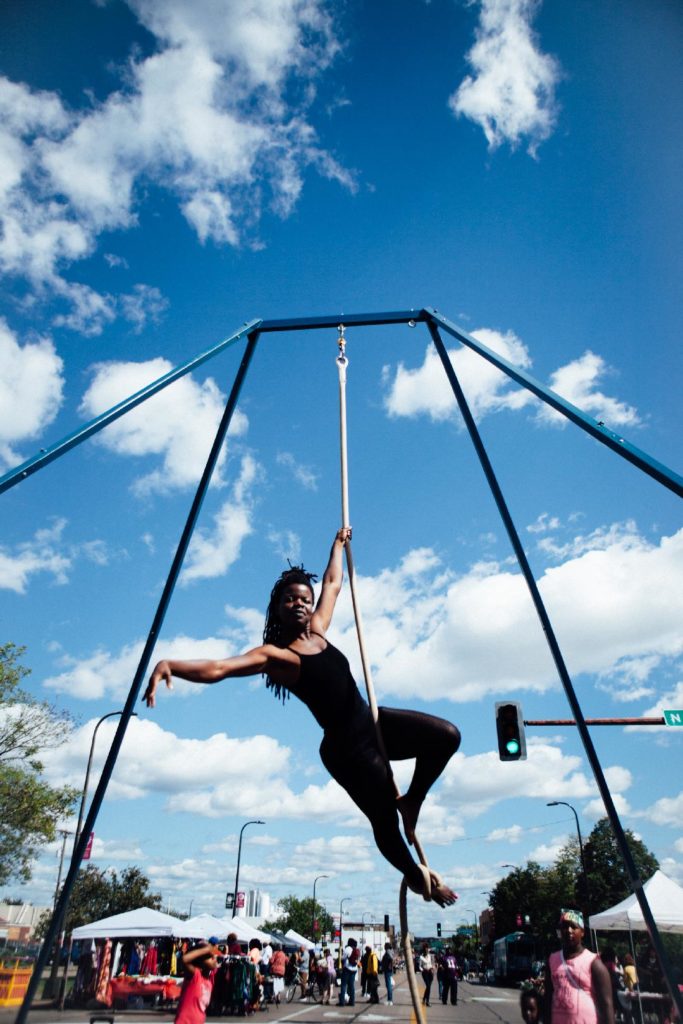
She performed in a play at Intermedia Arts called There Are Other Worlds, written by Minneapolis’s Junauda Petrus, which combined elements of acting, dancing, singing, and circus arts. This was Perry’s introduction to theatre as a performance artist.
Everything else she would become involved with was an offshoot of this.
“All of those things”— acting, dancing, singing, circus arts—”were things that I did to make money, and that’s when I started to call myself an ‘ARTrepreneuer,'” she says. “It wasn’t something I was raised and trained to do; I had a mortgage and I had to develop this system as a way of life.”
Today, Perry still wears about a dozen different hats, it seems, but one major focus is on her role as program manager for the West Broadway Business and Area Coalition (WBC), where she oversees the FLOW Northside Arts Crawl and Open Streets West Broadway programs. She came into this work by being a performing artist at these events, doing aerial performances, puppetry, you name it.
“I had done all these things to make money, but also to be able to have some creative control,” she says. She started putting on her own events and booking artists for these productions as well as the WBC events, and that turned into a full-time job.
“That business side came from all those years in finance training corporate folks, so I’m combining that experience and my art in what I’m doing now,” she says.
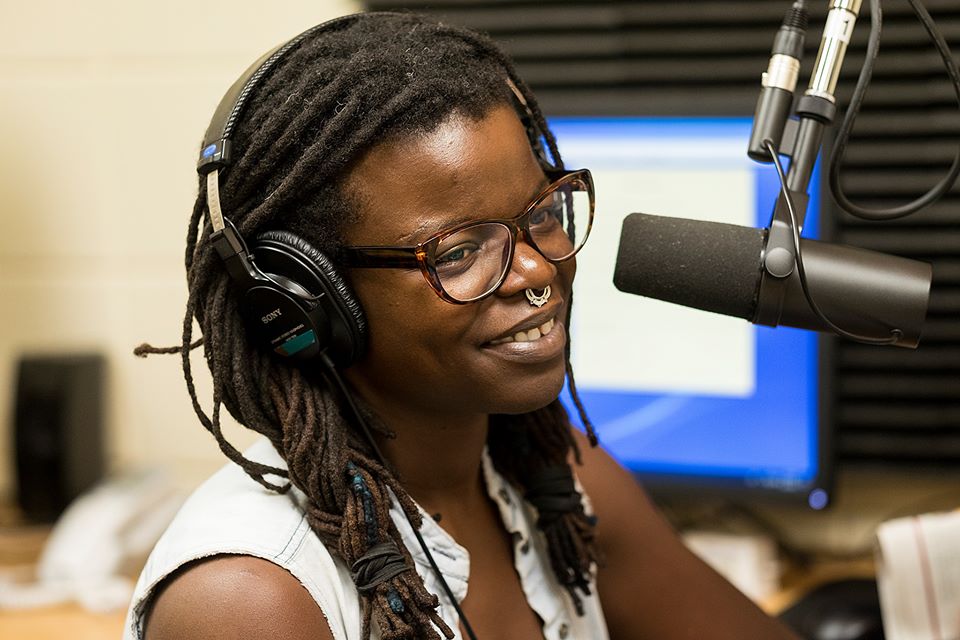
She has also hosted her “DesignHER Life” radio show for three years now, in addition to doing a little of everything in the arts world to make a living—booking, consulting, developing programs, and collaborating with arts organizations to continue building and supporting her own career.
“A lot of things overlap, so I do tend to do several things at once, which is why I use the term ‘ARTreprener,” because that is how I make money,” she explains. “There is so much overlap it doesn’t always make logical sense to other people, but this is all about how can artists exist in this world’s economic ecosystem and survive. To me it all makes sense.”
Perry also does a lot of work directly in and around economic activism through her involvement with the Association for Black Economic Power.
“A lot of my work is about building economic power,” she says. “A lot of small businesses here are creative enterprises, and those are a lot of the businesses I work with and consult through WBC and Springboard’s career consultations.”
Her radio show, DesignHER Life, is also informed by that work. For this show she covers “women ARTreprenuers around the globe revealing how they live their unique lives.”
“The idea for this came out of conversations I had been having with other artists on how we have to really create a new lifestyle and career path,” she says. “I’m doing all this with two children, managing motherhood and a career path.”
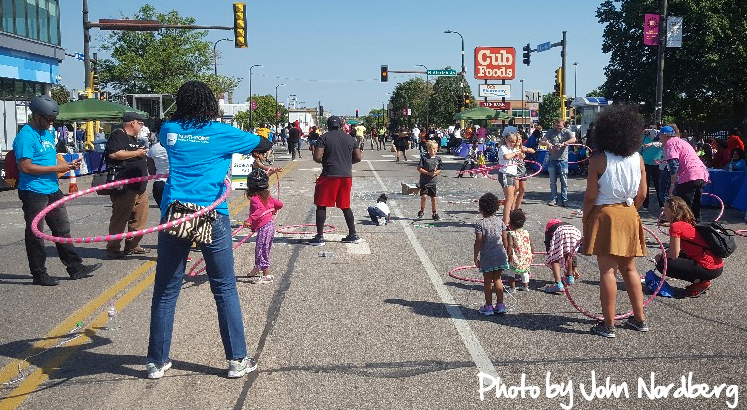
Now that she has a permanent position with WBC, one of the things she considers is how she can continue existing authentically as an artist within the nonprofit structure and still be able to pay her bills. But she feels fortunate to work with an organization that’s willing to evolve in the Northside Minneapolis neighborhood, an area that she says has a vibrant arts community but doesn’t receive the resources or support to reflect that.
“That’s why I like doing community events, because they bring people to our community to really experience who we are, what we do, and what we have to share,” she says.
She also enjoys being so close to home and being able to be so impactful within her own community where she lives, works, and raises her children.
In addition to all of this, Perry is also a 2019 fellow in Springboard’s 20/20 Artist Fellowship program.
“I really enjoy supporting and connecting with other folks, and as everything has evolved, the fellowship came as a way for me to figure out how I can keep doing that,” she says. “There was a period of time when my house was in foreclosure; how can I tell my children to pursue their dreams [when something like that happens]? There’s no road map for that.”
Through the support of the 20/20 Artist Fellowship, Perry was able to purchase items to help her be better able to do the work that she does, including some recording equipment so she can start podcasting. The fellowship has also given her a certain amount of recognition that she has been able to use to influence what’s happening in the local arts community. “All of us [in the arts community] do a lot of work with intentionality and we really try to shape the arts community here and far and wide with equity and diversity, and this has given me another platform through which to do that.”
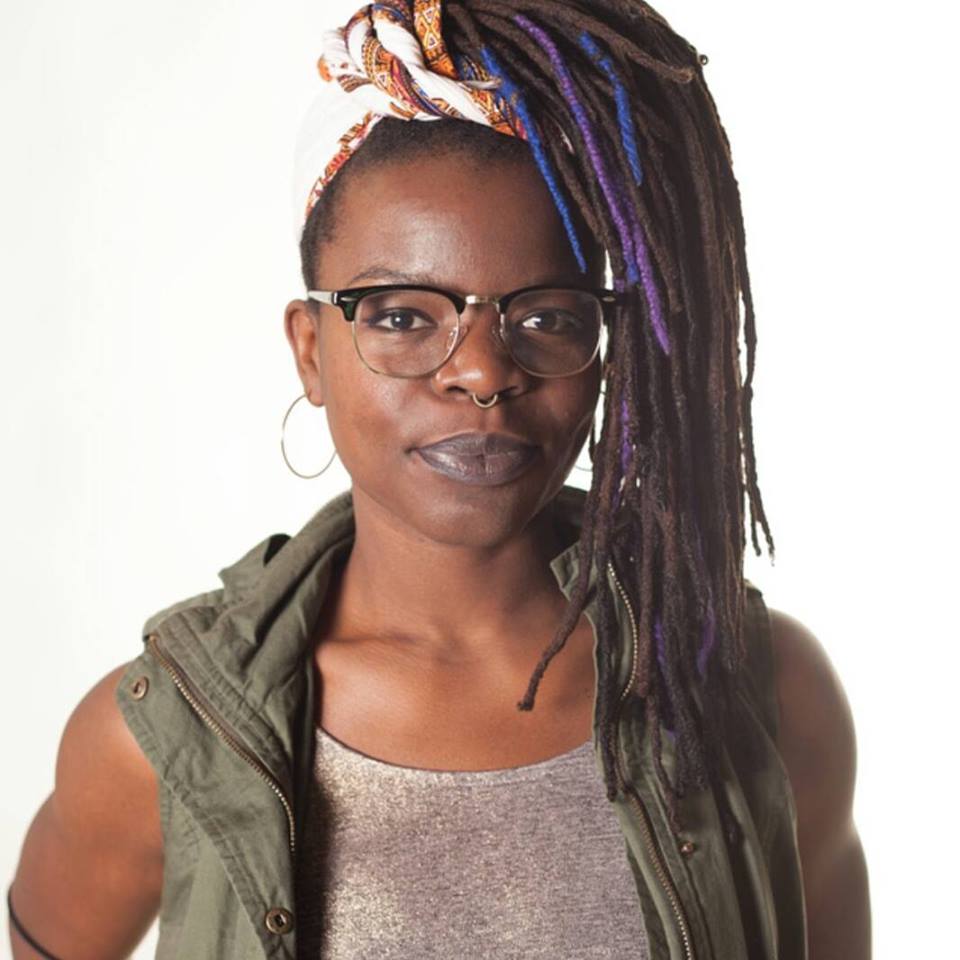
Perry was also inspired by the field trip she took to Springboard’s Fergus Falls office where she learned about the Hinge Arts Residency, which solidified her desire to bring some kind of artist residency to northern Minneapolis to further support, develop, and bring attention to her local arts community.
“The fellowship has allowed me the faith, opportunity, and resources to connect with folks, but also pursue opportunities in a way that is not detrimental to the stability of my family,” says Perry. “There have been times in the past where I’ve had to make sacrifices and choose either my work or time with my children.”
Perry says she has recently been laying low, “in planning and strategy mode,” but for someone laying low she still has a lot in the works: She has been working with Pete and Kim Rhodes of the Urban Mass Media Group, the only Black-owned cable network in Minnesota, on a special for their local urban affairs program, Urban Perspectives, in which she will interview residents displaced by the Francis Drake Hotel fire and share their narratives in a way that other media isn’t.
She’s also working on some exciting new things for WBC’s events, including a first-ever parade at the FLOW Northside Arts Crawl and getting the Minnesota Orchestra involved with Open Streets. She is excited to also be serving on the MayDay Council as the event retools for 2021, and has her podcast in the works as well. Otherwise, she says, “Stay tuned.”
Main photo of Felicia Perry by Adja Gildersleve.
Applications for the 2020 20/20 Artist Fellowship for BIPOC (Black, Indigenous, People of Color) and Native artists of all practices, disciplines, and career stages residing or working in Minnesota will open later this month. Check the website for complete details.

(1) How do you like to collaborate?
I like collaborating in intentional ways; not for the sake of collaboration. I like intentional collaboration that has a purpose and a goal because then that drives what’s sticking folks together. For me to stay committed to any sort of collaborative project really authentically, and to give as much as I can to it, that commitment has to come from some sort of intention, and for me that means something I’m passionate about. Fortunately for me, I’m passionate about a lot of different things!
(2) How do you start a project?
My projects start in my spirit. Largely the thing I love to do is dreaming and imagining. If it’s a project I initiated, it comes out of dreaming and imagination. Not just imagination; it also comes out of problems. It’s quite often that work that I do is in some ways a reflection of a problem. Usually the project is some sort of solution that I’m trying to explore. The way I think about solving problems, these problems we’ve had for a long time, I need to make space for imagining and dreaming because what I want doesn’t exist now.
(3) How do you talk about your value?
My value system is the underpinning of the things I’m really passionate about. My passions are around Black people, joy, breaking generational trauma, and my work in economic development comes from that. Seeing how those things impact out lives and the way we’re forced to live isn’t okay.
My value system is probably also the value system of how I price my material value depending on what I’m doing. I feel like I should get paid for my time and my intellectual property, and that includes the time I spend to prepare and the time spent researching and learning. So much value comes out of that, plus there is that little bit of magic that I put into anything I do that I believe I have. There’s not a line item for that, but it’s the thing that gives me the confidence to ask for compensation that I believe to be fair.
But equity over equality: I have to work harder than most people. The reality is I get paid much less because of the body I’m in and what this body looks like. I can’t go off the value system of the rest of the world because they don’t think I’m valuable. I know I’m getting paid less than a cisgender heterosexual white man for anything that I do.
I’m at a point where I’ve realized that because of who I am, how I identify, what body I am inside of, I can’t do it the way it has been done, not with what normally happens because of who I am, and what normally happens is I don’t get paid. People don’t generally value Black women’s time, labor, or intellectual property; it’s often used, but co-opted and appropriated. The people who live in these bodies don’t get compensated for their work.
I have to navigate in the arts in a way that protects me from that, and you have to be confident about it. People won’t like it, but you can’t try to live a life doing things you’re passionate about and depend on people liking you and compensating you for how they like you. You have to be strong and confident in who you are and what you’re doing.
Having all those responsibilities and still being the lowest paid demographic in everything, I absolutely have to imagine something else. It has everything to do with how I show up and exist in spaces when I’m told I don’t belong. I think I had to be told so many times “no” and “you’re not worthy” to wake up that conflict inside. Even though I didn’t really believe that I was still showing up that way because that’s what I was told.
(4) How do you define success?
I feel success in my heart. I feel it physically; the warmth in my chest and in my belly, and in the tension that releases and I feel good about what I’m doing.
My definition of having a successful life today is different than it was five years ago. I had to change that definition because of how I was feeling. I had to remove what other people thought about what I was doing and their markers of success that they put on me.
Success is very personal. This is part of the imagining that I love to do: I love to dream, imagine, and brainstorm about things, and when I imagine the person I want to be—the peace, the happiness—as close as I can get to feeling that in reality is success for me.
Success in my life is being able to find ways in whatever I do to show up very authentically with who I am and give myself to what I’m doing so that the light I have inside shines so brightly it’s seen as success to everybody. To me that’s success. Those are the moments I feel I can rest. Those are the moments where I really felt and looked back at the hard work I did and felt that that was worth it.
This idea that success is a point in time I think is false. How I show up any time, that moment that I can be authentically myself and feel good about what I did is successful to me. As an artist I’ve tried some scary stuff, so when I’ve done something new and felt like I learned from it, that’s a success. The way I live my life, I’m building on everything that’s happened before; the wisdom in who I am is building off who I was before, so any moment where I can build on those successes, that is success to me. Every moment I felt like I was very authentically myself and felt like who I was supposed to be is success to me.
“Success” is like a bad word; we should call it something else. People use these markers to define what “success” is, but those markers are dictated to us by other people. I remember people thought I was very successful in my corporate career and I was actually miserable. It didn’t feel successful at all; I’d rather just be robot. Success is a journey; we need to allow ourselves to be in that journey and be present and allow those moments in life to be what they are.
(5) How do you fund your work?
It changes as life does. Right now I am finding through my full-time job, that job funds my life. The money I’m using for anything artistic right now comes from that 20/20 fellowship. That has allowed me to purchase some equipment so I’ve been able to set up my podcast. Right now a lot of creative work I’m doing, like remodeling my workspace to also be an audio recording and editing space—that’s what the fellowship money is affording me to do. I can pay my bills with my job and that also allows me to keep building relationships with the arts community, which also helps in my contract work separate from the job.
Typically my work pays for itself by way of performance, but when I was doing that work I was finding out through doing it that I was putting my body through a lot to support family, like working in a steel mill. Now it’s looking different because I’m not performing like I had been. The fellowship gave me the space and the resources to make this shift so I don’t have to perform so much. I’m still dealing with the physical effects of putting my body through that, and now I have a choice not to.
For me it’s important to know that a year ago I had to dance to eat, and today I don’t have to. Most of the people in the dance company were in their 20s, but I’m about to be 40. I feel so grateful and amazed at the body’s ability to perform at that level, but I checked in with myself and the life imagined for myself wasn’t quite like that; it involved a little more tenderness with myself.
I feel like people want me to talk about how the money from the fellowship took my art to the next level, and eventually it will, but it’s also changed how I live and engage with it more. I didn’t have a transition from dancing; now I’ve had time to really prepare and strategize for the future. I’ve managed to set things up in a way where I’m working smarter and not harder, and I feel that stability I’m getting now. I’m setting up my life so I can actually do certain things instead of just dreaming about them. The fellowship has really given me the time and space to do that. It’s such a blessing in that way.
At first I was almost embarrassed because right away people started asking about the fellowship and what I’m going to do with the money, but the reason I applied for it in the first place was because you don’t have to produce anything as part of it; I felt that in applying for this fellowship it would be seen more as recognition for the work I’ve already done. It really feels like a stable foundation for me to comfortably and confidently launch off of.
